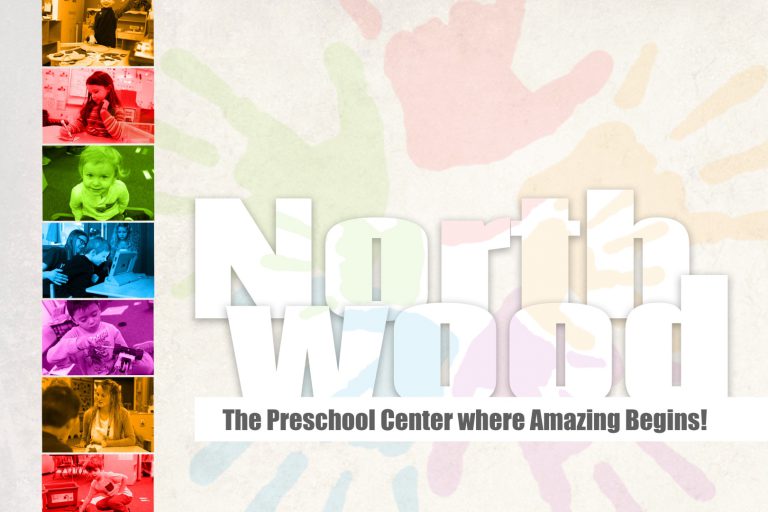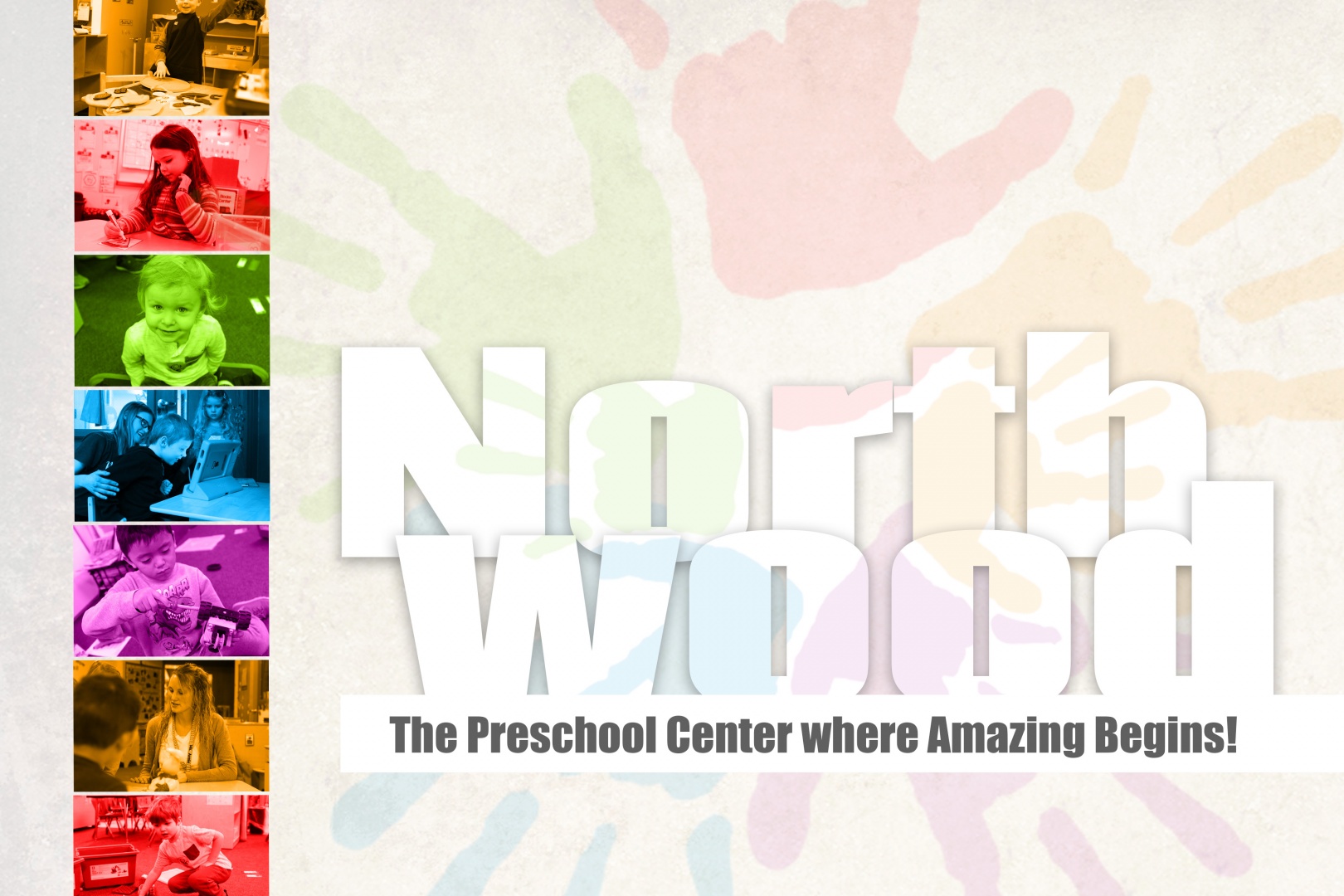

Northwood: The Preschool Center where Amazing Begins!

At Northwood Preschool Center, student inquiry drives instruction, creating an environment where learning possibilities never cease. Principal Kristin Barber, now in her second year at Northwood, said, “Students are in charge of their own learning. We have projects that are 6-8 weeks, but it’s not always about the content. It’s about allowing students to explore their own understanding and learn how to ask great questions.”
Northwood Preschool is a part of the free statewide voluntary preschool program that serves 4-year-olds and a separate grant that serves 3-year-olds. They also provide a half day early kindergarten program that meets kindergarten expectations. All teachers are dual certified, meaning that they can teach in both special and general education settings, making Northwood a full inclusion school. Barber says, “All students are immersed in the classroom experience, and this is incredibly valuable for their learning.”
Within any classroom at Northwood, you will see students interacting with each other in what looks like “play time” for the students. But what is happening, in reality, is project-based learning that incorporates play for students, hands-on learning, and reinforces peer to peer interactions in the process. This approach lays the groundwork for learning that has no bounds.
The Project Approach
“We look at what the students are doing and interested in. Sometimes it’s within the classroom, sometimes outside the classroom,” says preschool teacher, Annie Boldt. “A student comes in and shares something exciting about their weekend and this is the spark for our projects.” One project they spent a lot of time on this winter revolved around pizza.
The Project Approach is a specific kind of project-based learning that “brings a number of advantages to any classroom and represents best practices in 21st-century education. It fits securely within both a long history of innovative teaching and learning practices… and within the framework of today’s growing body of research on what students need to find success and fulfillment in the current (and future) world,” according to its website. Many teachers at Northwood have been formally trained on this approach.
Operating in three phases, projects have a complex but flexible framework within which teaching and learning are seen as interactive processes. The first phase explores what students already know. Boldt, like many other teachers, may say “it appears as though we have a lot of interest in pizza. What do we know about pizza?” And so the next 6-8 weeks begins.
It is likely that many of the students have eaten pizza, and as they are 3-4 years old, they are more than willing to share their experiences. As a class, they make a web of things that they already know. Some may have made pizza before at home, or have favorite toppings that they want to share. This inquiry ultimately leads to more questions, guiding the students into the second phase where they investigate some of the questions they have.
A student may ask “How do you make a pizza? What ingredients do we need?” The teacher uses those same questions as a way to guide the student toward resources where they can find the answers. Even how to ask a question – using the words “where,” “what,” and “how,” is part of this investigative phase. Sometimes the answers come through the use of technology, such as an iPad, in the classroom. Other times, it may require a field trip.
Thanks to the support of an amazing parent-teacher organization, there isn’t a local field trip that is off limits or a project that requires a moderate amount of funding that a teacher cannot do. The best way to answer the students’ questions is through experience. Where do the ingredients for pizza come from? The teachers say, “let’s find out.”
Field experiences “allow for the teachers to ensure all students have a base knowledge of the topic before further investigations begin,” says Northwood Instructional Coach Johanna Hicks. “Field experiences also allow for students to get answers to the questions they asked or stated they wanted to learn about when working on the classroom webs. They are like mini work study sessions. Teachers will prep the location and the students so they are able to get the most learning out of their time on the trip.”
It’s not uncommon for a couple of preschool classes to walk a few blocks to Wal-Mart, or board CyRide, the public transit bus system in Ames, and head across town. While at the grocery store, shopping list in hand, the questions continue, and the answers present themselves. Students are making observational drawings of what they see, and taking pictures on an iPad along the way to document their learning.
Play IS Learning
The project theme is embedded throughout the entire half day that students are attending Northwood. The project approach engages students on a variety of levels and is used alongside systematic instruction as a means of achieving curricular goals. But its focus is on exploration and hands-on learning rather than a strict content agenda. Rather than give students all the content they need, Northwood intends students to work for it: seek it out, request it, learn from each other, and explore their results.
Each teacher has a “pod mate” where two classrooms work together. These pods are determined by the geography of the building, and they allow teachers to share themes, resources, and activities. It also increases the student’s abilities to interact socially throughout the day, which is incredibly valuable for preschool aged students. Barber loves listening to 4-year-olds have a discussion about their experiences and loves the approach the Northwood teachers take with student learning. “It is truly student directed because they are thinking about what they already know and ask questions based on that.”
The theme is integrated during “play” as well. Students could use pizza tools for art, draw and write about pizza, measure and count, or take orders at a pizza parlor. For preschool-aged students, and really all students in general, “play” is a way for them to demonstrate some of the skills they have acquired, both academic and social. At Northwood, play is 60 minutes of the day.
A core philosophy that is embedded throughout the day and building at Northwood is how they have access to learning opportunities. With teachers being able to reach all students, and with a cadre of amazing educational associates, all students are engaged in the same learning process. Hicks says, “Teachers will put items in the different centers that extend learning done in a large group as well as project investigation. It is rewarding to observe students in play solving their own problems and using the materials and language they have learned independently.”
With each theme, the teacher is pulling from a classroom full of experiences. Although there are often common and popular themes among students, teachers are also aware that they are providing opportunities to students that they would never have. One of those experiences could be actually visiting a pizza shop and making pizza. Great Plains Sauce and Dough Co. in downtown Ames has been a gracious host to Northwood Preschool students. The 4-year-olds pack the kitchen and learn from first-hand experience how pizza is made. This experience helps move the students into the final phase of the learning process: the culminating event where students share their learning with families and friends.
Whether it’s pizza, or a variety of other themes such as trees, robots, exercise, or snow, the students steer the learning at Northwood with the engaging questions that should be supported in education.